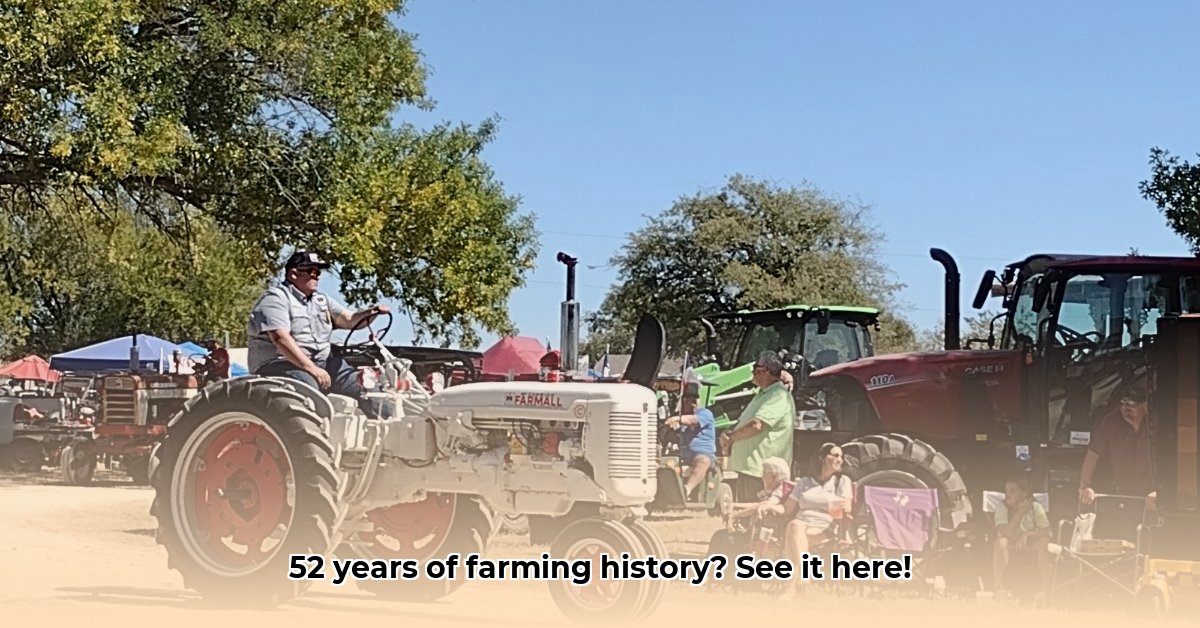
The Temple TX Tractor Show, a 52-year-old tradition, is more than just a display of gleaming antique tractors; it's a vibrant tapestry woven from the threads of agricultural history, community spirit, and the promise of a sustainable future. The event, held annually, offers a fascinating blend of nostalgia and innovation, showcasing both the ingenuity of past farming practices and the potential for environmentally conscious agricultural methods. But as the show gears up for its next iteration, questions of sustainability are at the forefront. Can this cherished tradition continue to thrive while minimizing its environmental impact? For more on similar shows, check out the Boonville Tractor Show.
A Celebration of Agricultural Heritage
The show's atmosphere is electric. The air hums with the low rumble of vintage tractor engines, punctuated by children's excited squeals and the friendly chatter of attendees. The scent of freshly turned earth mingles with the aroma of classic fair food – a sensory experience that transports you back in time while firmly grounding you in the present. Rows of meticulously restored tractors, some older than their owners, stand as testaments to the hard work and ingenuity of generations past. These aren't just machines; they are artifacts representing a time when resourcefulness was paramount, when repair over replacement was a necessity rather than a trend. This focus on repair and reuse subtly highlights a sustainable ethos that resonates deeply with today's environmental concerns.
But the show is more than just a static display. A lively flea market buzzes with activity, overflowing with vintage parts, tools, and other unique finds. This marketplace is a testament to a "repair and reuse" culture – a sustainable practice that mirrors the ingenuity of past farmers. Families stroll among the attractions, sharing stories and creating memories—a testament to the strong sense of community the show fosters. The affordable $10 admission fee (free for children under 12) ensures accessibility for all, cementing its role as an inclusive community event. Is there any wonder this event has captivated the hearts of locals and beyond for over five decades?
Sustainability: A Growing Concern
While the show's celebration of agricultural heritage is undeniable, its environmental impact deserves closer scrutiny. At first glance, a focus on antique machinery might seem to contradict modern sustainability goals. However, the inherent resourcefulness demonstrated by these older machines offers a valuable lesson. Farmers of the past operated within tighter constraints, often adopting implicitly sustainable practices out of necessity. The show's flea market, a testament to this resourcefulness, provides a compelling argument for embracing repair and reuse in modern agriculture.
However, the event itself could significantly improve its sustainability. The show might be considering a decrease in its carbon footprint through the implementation of renewable energy sources for power, or perhaps an expansion of its recycling and waste management programs. Could the show encourage the use of electric vehicle charging stations or incentivize carpooling and sustainable transport among attendees? Such initiatives would underscore the show's commitment to responsible practices.
Dr. Emily Carter, Professor of Environmental Science at the University of Texas, Austin, states, "Events like the Temple TX Tractor Show have a unique opportunity to model sustainable practices. Incorporating renewable energy sources and robust recycling programs can drastically reduce their ecological footprint, while simultaneously educating attendees about sustainable agricultural techniques."
The Path Forward: Building a Greener Future
The Temple TX Tractor Show’s success hinges on its ability to adapt and innovate while preserving its rich heritage. One critical area for improvement is enhancing its sustainability. A systematic approach involving data collection is key to achieving this. By tracking resource consumption (water, energy, waste) before, during, and after the event, organizers can establish a baseline, identify areas for improvement, and measure the impact of implemented changes. Transparency in reporting these findings will build trust and encourage wider participation in sustainability initiatives.
The show's organizers could also consider adding educational components, offering workshops, or showcasing innovative sustainable agriculture practices. By integrating education into its programming, the show has the potential serve as a platform for raising awareness about environmental responsibility within the agricultural community. This would broaden the event's appeal and ensure its long-term relevance.
In conclusion, the Temple TX Tractor Show is a valuable community asset with a rich history. By integrating sustainable practices, it can enhance its legacy and become a model for environmentally conscious events. The next chapter of this 52-year-old tradition can be even brighter, striking a harmonious balance between celebrating the past and shaping a sustainable future for agriculture.
Measuring Agricultural Sustainability